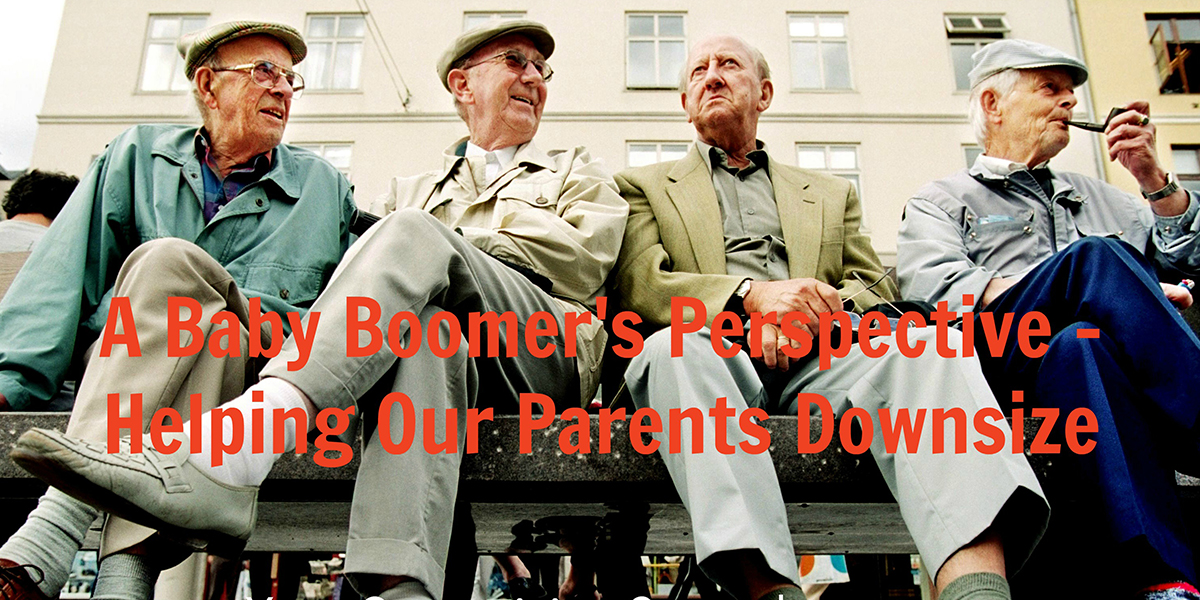
A Baby Boomer’s Perspective: Helping Our Parents Downsize
Being a “baby boomer” with aging parents (we don’t use the “O” word) is a challenge. Someone has to manage their finances, medical care etc., in addition to managing their own lives. Some people transition into this next phase easily, while others may struggle. My mother in law blossomed when she moved into a Continuing Care Community. All the people, the activities, and the fine meals prepared there… visiting her seemed like geriatric camp!
The beginning :
- The ideal situation is when parents make the decisions to plan ahead, before something “happens.” They will have a say on how things will unfold and won’t be feeling left stuck. Communication is key. Remember, this is a huge life change for them so check your ego at the door. If you can’t communicate, get a mediator to help you through the process.
“What if they don’t want to move?”
- The longer they wait or postpone the process, the harder it will be. Period. As children, we can, as usual, be a blessing and a curse. They want us there, but don’t want our opinions. Personally, I was not invited to help my mother when she downsized. It was emotional and difficult to understand. The expert was banned from doing what she does best.
Avoid crisis :
- Don’t wait for the crisis to happen, and being prepared for every scenario is important. Think about the worst case and consider all the events that will follow: transportation, after care, meal preparation, hygiene and so on. These are all possible circumstances that will need to be addressed after a crisis.
- Once you are in the crisis, things move very quickly. This can be very disorienting and stressful for your parents (and you too).
- Transition is hard for everyone. Finding the right place will give your loved ones peace of mind and security. A member of my family couldn’t return to their home and moved to a facility that was chosen by their kids. It was ok, but then quickly declined in quality of care. This resulted in moving an 85-year-old with Parkinson’s twice within a few years. Very disorienting.
- How a facility is managed can tell you a lot. For my mother, we opted for a place that is managed by the community or a residents board of directors.
What about the stuff?
Where do you start with a lifetime of possessions?
- Start as soon as possible. What does that mean? As soon as they start warming up to the idea of moving, talking about moving or start looking at new places, begin to sort.
- Implement deadlines. Set a goal of when decisions need to be made, and if the deadline passes the stuff goes into the trash or donation bin.Start in the attic, basement or garage. The big things are easy (we call this cherry picking). Extra furniture, appliances, or things they no longer use. Shift into the smaller items, like things they will no longer need in their new place: bikes, shovels, tools, etc., can all go…
- Excess items are easy to let go. In a small space, you will only need so many household goods. Entertainment items can be paired down to just the basics.
- Kids: our parents are not responsible for our stuff from high school and college. Help them make the decision to let go of your old things.
- Emotional items are more difficult. It’s ok to leave those to the end. Pick your battles and make realistic decisions. Small stuff is good, but the bigger stuff might be more difficult, but find a balance.
To store or not to store?
- The storage decision is hard. Be realistic on what you need to store. I have a client who has spent $50K on storage since her dad died. I am sure what is in there is not worth that in dollars to store it.
- The only way I can recommend storage, is if there is no way you can get them to change their mind . Have the hard conversation, but sometimes it’s not worth the battle.
- If it’s a non-negotiable decision, respect their choice. It’s okay to re-visit the conversation. Suggest going through the unit in six months. They might feel better about making decisions once they have settled into the new space and relaxed.
- My number one word of wisdom is- Do not bring everything to your house to sort, too many people have called me with a basement or a garage full of their parent’s things. My aunt died thirteen years ago, at the last minute we packed a couple of boxes to sort through at my mother’s house…they are still there.
This is a difficult time for everyone. We need to drive the process, learn to listen, be empathetic or supportive while maintaining a good relationship with our parents.


